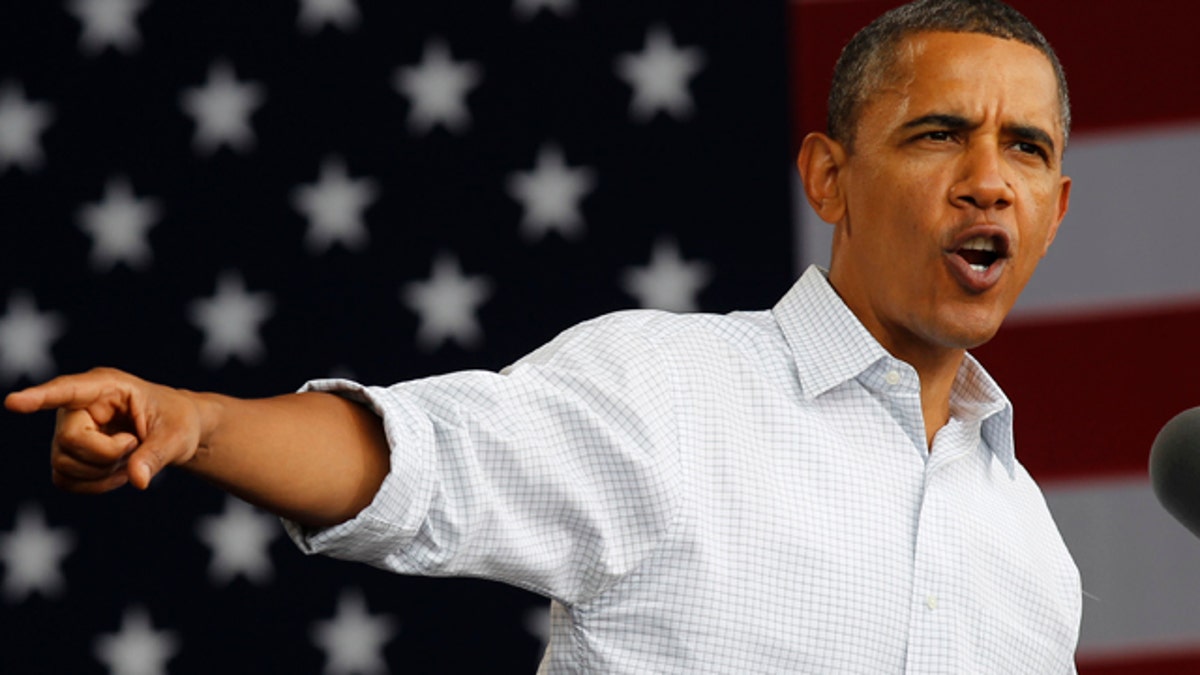
Monday: President Obama gestures as he speaks on the economy at the Milwaukee Laborfest in Milwaukee. (AP)
It may look like a second stimulus and smell like a second stimulus, but President Obama insists that's no way to describe the new set of initiatives he's introducing this week in his latest effort to boost the flagging economy.
At the same time, the president is trying to put Republicans on the defensive for saying no to some proposals that are filled with GOP-style tax breaks.
Some analysts says the president's strategy is smart and could help Democrats soften the blow they're expected to face in the Nov. 2 election. But others say Obama seems to be throwing a Hail Mary pass, because none of his proposals are likely to pass with lawmakers focused on campaigning.
Republicans, meanwhile, have been careful to offer strong critiques of Obama's proposals to avoid looking like obstructionists heading into the crucial midterm elections.
"Look, desperate people do desperate things," Brad Blakeman, a former deputy assistant to President Bush, told Fox News . "This president's policies have not been working.… This is the only argument they have. It's falling on deaf ears, as we've seen by the polls. That's not going to work."
Democratic pollster Doug Schoen told Fox News that Obama's strategy can work because the only people who are less popular than Democrats are Republicans, and that it's more effective than arguing that Obama has done a good job.
"While I don't think it's going to get the Democrats over the finish line, it might minimize the losses," he said.
In a Labor Day speech in Milwaukee, Obama called for $50 billion more in infrastructure spending to rebuild roads, railways and runways -- a proposal that GOP leaders immediately cast as dead-on-arrival.
Obama will also pitch a $100 billion proposal Wednesday to increase and make permanent research and development tax credits for businesses. Obama is expected to ask lawmakers to close tax breaks for oil and gas companies and multinational corporations to pay for the plan.
The administration is also urging the Senate to pass the small business bill that calls for about $12 billion in tax breaks and a $30 billion fund to help unfreeze lending. But Republicans have likened the bill to the unpopular bailout of the financial industry.
Obama also wants to make permanent the Bush tax cuts for the middle class but allow them to expire for households making $250,000 or more.
The president taunted Republicans for consistently opposing his economic policies and said they seem to be running on a slogan of "No, we can't," playing off his 2008 presidential campaign mantra of "Yes we can."
"If I said the sky was blue, they'd say no," Obama said. "If I said fish live in the sea, they'd say no."
Blakeman said Obama's rhetoric makes no sense.
"In 2008, they gave him the key to the kingdom, the House, the Senate and White House, and there's not much the Republicans could have done," he said. "But I'll tell you what the Republicans should do. We shouldn't be the party of 'no,' we should be the party of 'Hell No' to the Obama policies."
So far, that's been exactly the response from Republican leaders.
Senate Minority Leader Mitch McConnell of Kentucky said Obama's plan "should be met with justifiable skepticism." He said it would raise taxes while Americans are "still looking for the 'shovel-ready' jobs they were promised more than a year ago" in the $814 billion economic stimulus measure.
The House minority leader, John Boehner of Ohio, added, "We don't need more government 'stimulus' spending. We need to end Washington Democrats' out-of-control spending spree, stop their tax hikes and create jobs by eliminating the job-killing uncertainty that is hampering our small businesses."
Rep. Dave Camp, the top Republican on the Ways and Means Committee, said the research and development tax credit is a good idea that would be negated by the proposed tax increase to pay for it.
"Raising taxes to cut taxes is at best a zero sum game that will not improve our economy or the job market and is particularly disappointing in light of the billions of dollars of wasteful stimulus spending that could be cut instead," he said in a written statement.
Brookings senior fellow Bill Galston, a former domestic policy adviser to President Clinton, praised the infrastructure package but added that the proposal may never see the light of day in Congress.
"With the midterm election campaign in full swing and political polarization at its highest level in more than a century, cooperation across party lines will be hard to achieve -- even though the initial Senate bill was introduced with bipartisan support just a few years ago," he said in a written statement. "In the longer term, a bank structured to reduce politically motivated earmarks and to expose proposed infrastructure projects to a market test might attract a broader base of support than is now in evidence."
The Associated Press contributed to this report.




